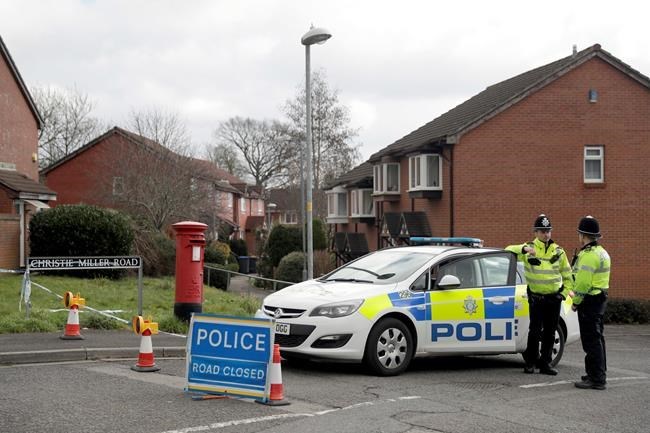
Police officers stand guard at the bottom of the road where former Russian double agent Sergei Skripal lives in Salisbury, England, Tuesday, March 13, 2018. The use of Russian-developed nerve agent Novichok to poison ex-spy Sergei Skripal and his daughter makes it "highly likely" that Russia was involved, British Prime Minister Theresa May said Monday. Novichok refers to a class of nerve agents developed in the Soviet Union near the end of the Cold War. (AP Photo/Matt Dunham)
Republished March 14, 2018 - 10:18 AM
Original Publication Date March 14, 2018 - 4:46 AM
LONDON - Key developments in the nerve-agent poisoning of former spy Sergei Skripal and his daughter Yulia:
2010 — Sergei Skripal, a former Russian military intelligence officer jailed for spying for Britain, is released and flown to the U.K. as part of a swap with Russian agents caught in the United States. He settles in Salisbury, 90 miles (145 kilometres) southwest of London.
March 3, 2018 — Yulia Skripal arrives at Heathrow Airport from Russia to visit her father in England.
March 4, 1:40 p.m. — Sergei Skripal's red BMW is parked at a lot in central Salisbury.
March 4, afternoon — Sergei and Yulia Skripal visit the Bishops Mill pub.
March 4, 2:20 p.m.-3:35 p.m. — Sergei and Yulia Skripal have lunch at the Zizzi restaurant.
March 4, 4:15 p.m. — Emergency services are called by a passer-by concerned about a man and a woman in Salisbury city centre. Officers find the Skripals unconscious on a bench. They are taken to Salisbury District Hospital, where they remain in critical condition.
March 5 — Police say two people in Salisbury are being treated for suspected exposure to an unknown substance. The force does not identify them but the BBC reports the man is Sergei Skripal.
March 6 — Counterterrorism detectives take charge of the investigation. Foreign Secretary Boris Johnson tells lawmakers it is too early to say who was responsible but calls Russia "a malign and disruptive force."
March 7 — Police announce that the Skripals were likely poisoned with a nerve agent in a targeted murder attempt. They disclose that a police officer who responded to the incident is in serious condition in a hospital.
March 9 — About 180 troops trained in chemical warfare and decontamination are deployed to Salisbury to help with the police investigation. Russian Foreign Minister Sergey Lavrov says Moscow might be willing to assist with the investigation but expresses resentment at suggestions the Kremlin was behind the attack.
March 11 — Public health officials tell people who visited the Zizzi restaurant or Bishops Mill pub in Salisbury on the day of the attack or the next day to wash their clothes as a precaution.
March 12 — Prime Minister Theresa May tells the House of Commons that the Skripals were poisoned with Novichok, a military-grade nerve agent developed by the Soviet Union during the Cold War. She says it's highly likely it came from Russia, and gives Moscow until midnight March 13 to provide an explanation or face "extensive" retaliatory measures.
March 13 — Russia says it won't respond to Britain's deadline unless it is given samples of the nerve agent. Lavrov says allegations of Russian involvement are "nonsense."
March 14 — May announces in the House of Commons that Russia is "culpable" of the Skripals' attempted murder. She says Britain will expel 23 Russian diplomats, suspend high-level contacts with Moscow and take new measures against "hostile state activity."
News from © The Associated Press, 2018